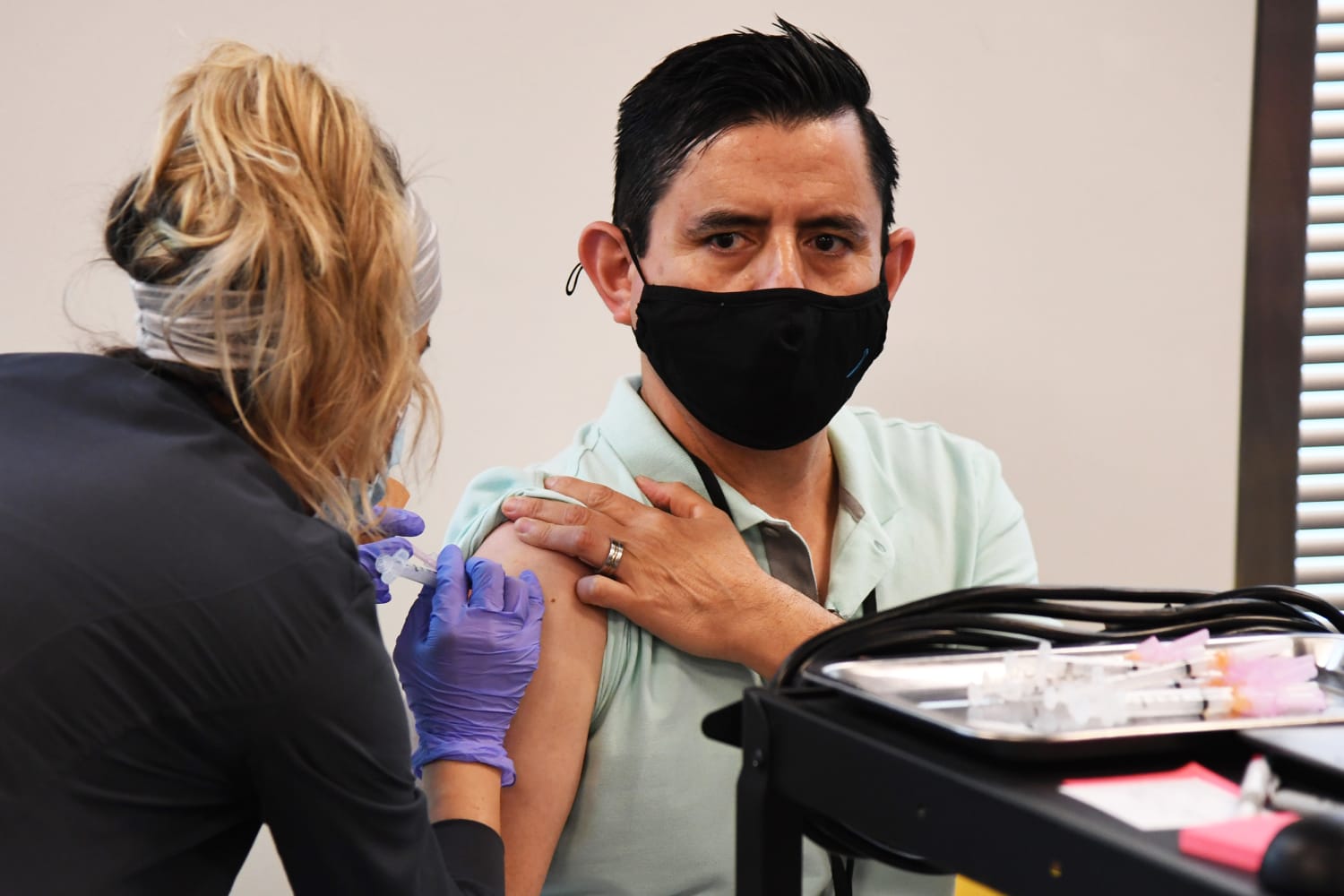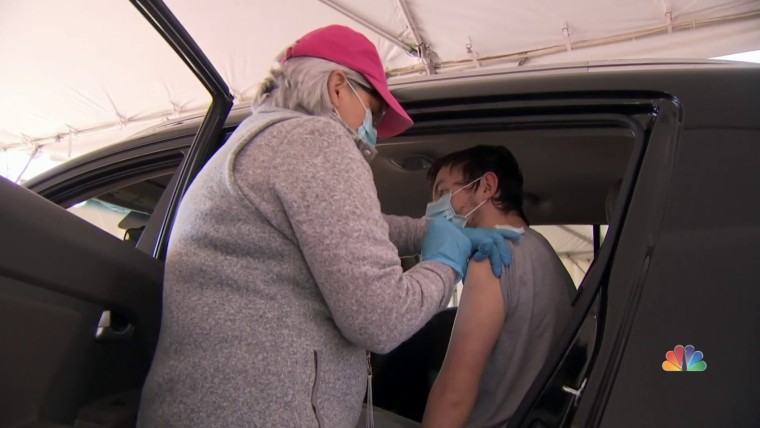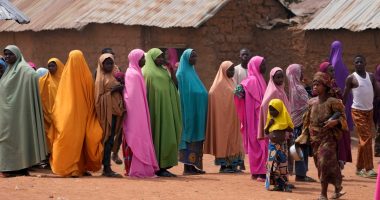Covid-19 vaccines were not available to most people in the United States when Blanca Macias went to get her shot back in March. While there, she was asked for her ID and health insurance — even though the vaccines are available at no cost.
“That’s when a bell just kind of went off in my head. This is why our community is not getting vaccinated,” Macias, who lives in Las Vegas, said. “It was a deterrent.”
While she was able to get her shot that day, she noticed a Spanish-speaking man in his 60s seeming discouraged as he was trying to get information but no one could help him.
“I started talking to him in Spanish, like trying to get him to stay, to get vaccinated, but he left,” she said. “It was upsetting.”
That’s when Macias, the director of operations for the immigrant rights organization Make The Road Nevada, pivoted from her usual work and started advocating for vaccine accessibility in her community. Shortly after, the nonprofit Immunize Nevada reached out to her to see what they could do to help get more Latinos vaccinated. “I was like, ‘I have an office. Let’s do a pop-up clinic,’” she said.
Both groups are coming together to host a vaccination clinic Saturday during the Memorial Day weekend at the Make The Road headquarters. They are partnering with Walmart to get 300 Pfizer vaccine shots. “But if we find out that 300 is not enough, we have 200 on reserve,” she said.
So far, about a quarter of Latinos living in Nevada have received at least one dose of a Covid-19 vaccination, an increase from last month’s 15 percent. Sen. Catherine Cortez Masto, D-Nev., the first and only Latina in the Senate, attributes the rise in Latino vaccination rates to growing efforts to meet Latinos where they are and help them overcome language barriers, as well as provide time flexibility in order to be able to take time off work to get vaccinated.
“I know in my community, that if you bring the resources into the community, and you overcome that language barrier, then they’re willing to participate. They will make sure that they’re getting access to the information that they need for themselves and their families. And that’s exactly what we saw,” Cortez Masto told NBC News.
Nevada is on its final stretch to get as many Latinos as possible vaccinated as the state gets ready to fully reopen June 1, and to speed up the process they are putting in place lessons learned about initial vaccine hesitancy and lack of accessibility.
Pivoting from DACA guidance to Covid issues
When the pandemic first hit the U.S. last year, the immigrant rights organization Dream Big Nevada started doing weekly Facebook Live videos to provide updates ahead of the Supreme Court’s decision on the Deferred Action for Childhood Arrivals program, or DACA.
But the group quickly realized that the immigrant community it serves, many of whom are Latino, was looking to them for information that could help them figure out where to get food if they lost their jobs, if they could get tested for Covid-19, and answer their questions about the vaccines.
“Our job was immigration, it was ‘Dreamers,’ it was DACA, but we saw that there was a strong need within our community for them to receive information about the vaccine,” Dulce Valencia, deputy director of Dream Big Nevada, said. “So then, we really just rose to the challenge of meeting our community where their needs were.”
The initial vaccination process for Nevadans included getting an appointment to go to a mass vaccination facility at a convention center or a baseball field, options that seem intimidating to many immigrants and Latinos, she said.
“Those places are humongous. You have the National Guard there, people in uniforms. You have nowhere where people can sit if they’re elderly and there was no one translating,” she said. They were able to resolve these issues when they hosted their own vaccine clinic inside the community center they work from.
Latinos wanted to get the vaccine, it was about access
The Dream Big Nevada headquarters became a pop-up clinic for the entire month of March. Up to 500 people would line up outside their offices daily to get vaccinated.
“They had spent a year watching our Facebook Lives, so when the vaccine opened up, they knew that they could come here,” Valencia said. “What you were hearing in the news, was that Latinos didn’t want the vaccine, that Latinos didn’t want to get it. And what we were finding is that Latinos wanted to get the vaccine, they just didn’t know if or where they could get it.”
Dream Big Nevada helped administer about 4,000 doses in total.
“It’s important for me to share with my colleagues that part of this is making these mobile sites, going into the communities where Latinos live, educating them, talking to them, overcoming the barrier, overcoming their time constraints, because they will get vaccinated,” Cortez Masto said.
Dream Big Nevada participated in two additional pop-up clinics ahead of Cinco De Mayo, including one created as part of the City of Las Vegas’ Cinco de Mayo celebration. According to Cortez Masto, the event can serve as a model for getting Latinos and other communities of color vaccinated. Of about 600 who attended the celebration — which had food, music and dancing — nearly 150 Nevadans were vaccinated for the first time.
“They were not only getting the vaccine, but they were also getting a taste of normalcy with the event, because for many, it was the first time in over a year that they were able to gather in a larger group than just our immediate family members,” Valencia said.
Combating misinformation — through “mom”
Getting more Latinos vaccinated caused a ripple effect that helped combat misinformation falsely claiming that the Covid-19 vaccine was unsafe.
Macias thought that after getting her shot, she could convince her mother to get vaccinated by sharing her experience with her. But her mother, who is originally from Mexico, was still worried about all the misinformation she had seen on social media and on TV claiming that the vaccine was unsafe.
So Macias grabbed the fact sheets she got when she received her vaccination and created a Spanish-language presentation for her mother based on that information. Her efforts to convince her mother were successful, and to make her feel more comfortable at the mass vaccination center, they made it a family event. Macias’ mother, stepdad and her two siblings went to get the shots at the same time.
Now, Macias’ mother is helping her promote Make The Road Nevada’s upcoming pop-up vaccination clinic in an effort to get Covid-19 shots for unvaccinated Latinos in their community.
Lizbeth Alvarez, a public relations coordinator with KPS3, took this a step further and helped design the Spanish-language outreach campaign “Pongamos de nuestra parte” (“Let’s do our part”) for Latinos in Nevada’s Washoe County. She did it in a way that spoke to the values that characterize the community locally.
Alvarez, who grew up in Reno, is featured in the campaign, alongside other trusted Latinos who are known in the community for being leaders, business owners and entrepreneurs. That triggered reactions from people in the community who started sharing their own experiences with campaign organizers, from wearing a mask to inspire others to do the same to opening up about contracting Covid-19.
Campaign organizers shared these stories on social media, particularly on Facebook. Alvarez said the information became crucial to the community which had no local Spanish news station.
“It really resonated with the people, even if it wasn’t them or their family member. But it could have been. And that ‘could have been’ is what kind of drove everybody to start sharing their message.”
The group also put Spanish-language billboards featuring Latinos in the community across northern Nevada. “If you’ve ever been here, we don’t have billboards in Spanish,” Alvarez said. “So seeing ‘Pongamos de nuestra parte’ somewhere outside of a casino when you’re driving to work, that was huge for our community.”
Against this backdrop, Cortez Masto recently reintroduced an updated version of the Covid-19 Health Disparities Action Act that would support targeted and culturally competent public awareness campaigns about Covid-19 vaccines.
“We have to find how we can go into these communities where there’s relationships with leaders that can tell the truth and get that information out there,” she said. “That is a lesson learned, and that’s what we should always be doing.”
Follow NBC Latino on Facebook, Twitter and Instagram.
Source: | This article originally belongs to Nbcnews.com









